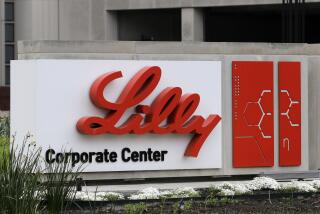Alzheimer’s Slowed by Vitamin E, Study Finds
- Share via
In the latest of a remarkable string of new findings about the prevention or slowing of Alzheimer’s disease, researchers report today that either vitamin E or a common anti-Parkinson’s drug can significantly delay the deterioration of daily functioning caused by the debilitating disease.
It is the first time that researchers have been able to slow the progression of the disease in patients who have already developed significant symptoms.
A multi-center team reports in today’s New England Journal of Medicine that vitamin E could delay admission to a nursing home by seven months. The Parkinson’s drug, selegiline, was nearly as effective.
Recent reports have shown that both estrogen replacement therapy and ibuprofen can delay the onset of Alzheimer’s in people with no symptoms. Today’s results “are very exciting findings because . . . they show for the first time that drugs are effective for people with the moderately severe stages of the disease,” said Edward Truschke, the president of the Alzheimer’s Assn.
Gerontologist Mary Sano of the Columbia University College of Physicians and Surgeons, who directed the study, said, “I think it’s a big deal. These are outcomes that relate to the quality of life for patients and their families.”
While the researchers are reluctant to say that Alzheimer’s victims should be taking either vitamin E or selegiline solely for treatment of that disease, they note that the vitamin has a variety of other beneficial effects as well.
“They should be taking [vitamin E] for a lot of reasons,” said Dr. Lon Schneider of USC, another of the study’s researchers. He cautioned, however, that the side effects of the high doses of vitamin E used in the trial have never been studied, and it could be dangerous for people with bleeding disorders or those taking blood thinners.
Selegiline--trade-named Eldepryl--is not approved by the Food and Drug Administration for use in treating Alzheimer’s, but physicians can prescribe it for that purpose if they desire. But the researchers cautioned that it is no more effective than vitamin E, can have more severe side effects and can interact adversely with other drugs.
Alzheimer’s is characterized by memory loss, disorientation, depression and a deterioration of bodily functions. It is ultimately fatal, causing about 100,000 deaths in the United States each year. About 4 million Americans suffer from it, most of them over the age of 65.
The disease is produced by the progressive loss of brain cells, although it is not yet clear what causes this loss. Laboratory studies, however, show that the mechanism involves destructive oxidation of brain-cell components by highly reactive chemicals called free radicals.
Both vitamin E, which is also known as alpha-tocopherol, and selegiline are antioxidants, chemicals that bind with free radicals and neutralize them. Selegiline also increases the supply of dopamine and catecholamines, important brain chemicals whose levels are reduced in Alzheimer’s.
The 341 subjects in the study were Alzheimer’s patients whose disease had progressed too far for them to be included in ongoing studies of other anti-Alzheimer’s drugs, Schneider said.
They were divided into four groups. One group received vitamin E, one received selegiline, the third received both drugs, and the fourth received a placebo. The vitamin E group members each received 2,000 international units per day, more than 60 times the government’s recommended dietary allowance of 30 units.
The researchers, who included Dr. Leon J. Thal of UC San Diego and Carl W. Cotman of UC Irvine, looked for one of four “end points” for the study: death, entry into a nursing home, loss of the ability to perform the activities of daily living or progression to severe dementia.
They found that the average elapsed time to the first end point reached by any subject was 670 days for those treated with vitamin E and 655 days for those treated with selegiline, compared to 440 days for those receiving a placebo.
“We looked at the signs and symptoms of Alzheimer’s disease that can worsen over time and found that, in patients taking these drugs, these signs occurred later,” Sano said.
“This study reinforces the thinking that oxidative damage plays a role in Alzheimer’s disease,” said Neil Buckholtz, the acting chief of the dementias of aging branch of the National Institute on Aging. Now that it has been demonstrated that the drugs are effective relatively late in the disease, he said, researchers will study whether the antioxidants can retard the disease when given earlier in its course.
One finding that has mystified researchers, however, is the poor result in the group that received both selegiline and vitamin E. That group averaged 585 days to the study end point, intermediate between the 440 days with a placebo and the 670 with vitamin E.
Previous laboratory studies had suggested just the opposite--that the two drugs would have a more powerful effect together than separately. The new findings suggest that is apparently not the case, however. “It reminds us that two drugs are not necessarily better than one,” Sano said.
Researchers also do not know whether the same thing would happen if the antioxidants are combined with other drugs--such as estrogen, ibuprofen, tacrine and the recently approved donepezil.
Estrogen and ibuprofen have both been shown to delay onset of the disease when taken before symptoms develop. While some scientists believe that the antioxidants could be effective during that period, there have not been any studies to determine whether this is the case.
In contrast, tacrine (Cognex) and donepezil (Aricept)--like the antioxidants--are given in the disease’s early stages. They have been shown to improve memory and thought processes, but not to delay the disease’s overall progression.






